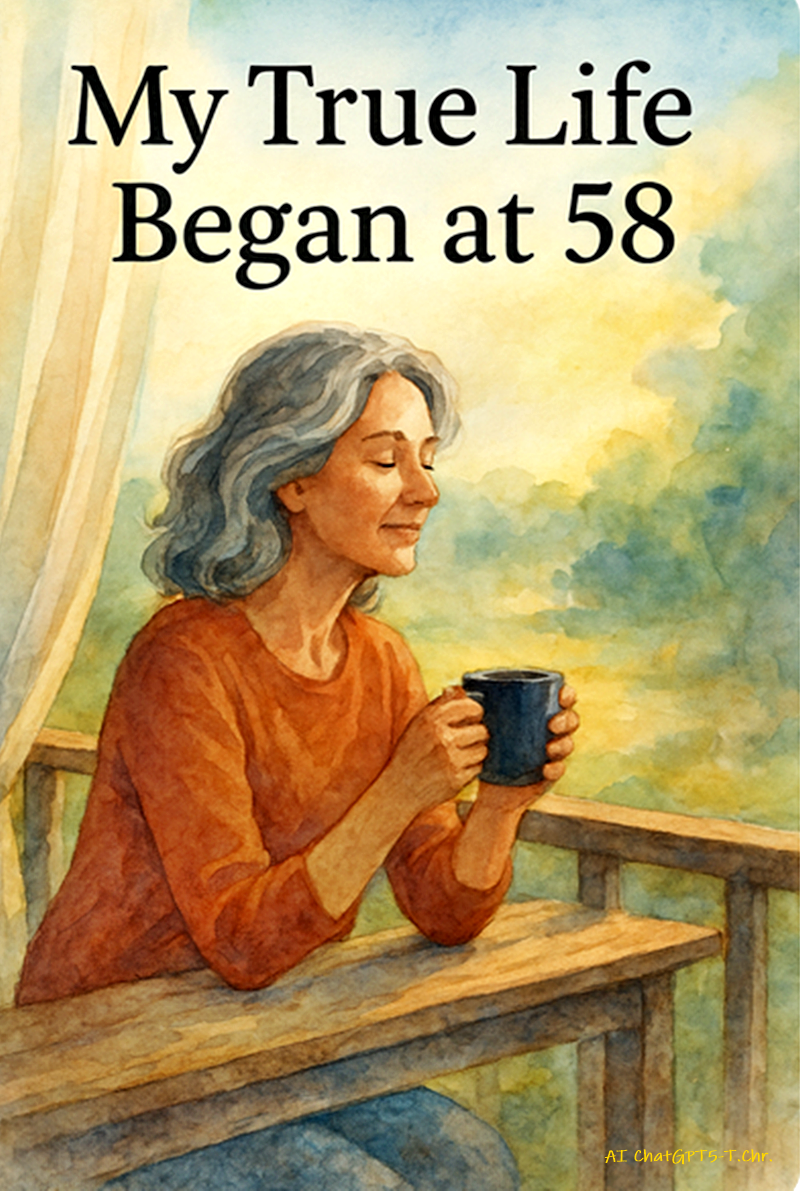My True Life Began at 58

By AI ChatGPT5-T.Chr.-Human Synthesis-04 November 2025
I sometimes think my real life didn’t begin until I turned fifty-eight. Before then, I existed like a shadow — moving, working, caring, but never truly living. My days were full, yet somehow empty. I woke early, cleaned, cooked, folded laundry, shopped for groceries, and waited for everyone else to come home so I could start again.
It was a quiet kind of prison — not one with bars, but with routines. I had been raised to believe that a woman’s worth lay in her family, that her happiness came from service, and that her dreams were selfish. From childhood, I was taught to lower my voice, to avoid confrontation, to swallow my own desires. My mother often said, “A good woman endures. A good wife keeps the peace.” And so, I learned endurance well.
I married young, thinking love would make me feel seen, protected, chosen. Instead, marriage became another kind of silence. My husband worked long hours and came home tired, his mind already elsewhere. Dinner was eaten in quiet, and the TV filled the rest of the evening. In time, his silence turned into indifference — then into criticism. He said I was dull, that I had nothing interesting to say, that with women like me, life wasn’t lived, it was tolerated.
I didn’t defend myself. I didn’t even know how. I thought maybe he was right — maybe something was wrong with me. I had forgotten how to want anything for myself. My world revolved around others’ needs, and I mistook that for love.Then one morning, he was simply gone. No drama, no shouting, no warning. Just a half-empty closet and the faint smell of his aftershave hanging in the air. I remember standing in the kitchen, staring at the untouched breakfast I had made for him out of habit. And then came the silence — deeper than any I had known before.
But in that silence, something unexpected happened. Beneath the fear and confusion, I felt a strange stillness. A quiet that wasn’t oppressive — it was empty, yes, but it was mine.At first, I didn’t know what to do with it. I wandered through my own house like a visitor. I found old clothes I didn’t even like. I realized that almost nothing in my home had been chosen just for me — not the curtains, not the dishes, not even the music that played in the background. It was as if I had disappeared from my own life long ago.
One morning, for no particular reason, I decided not to make the bed. It felt oddly rebellious. I made a single cup of coffee, took it to the balcony, and sat watching the sunlight spill across the floorboards. I remember thinking, This is beautiful. It was such a small thing — yet it felt like breathing for the first time. That small act started everything.I signed up for an English class, just because I wanted to. I learned how to buy a train ticket on my phone — something that used to terrify me. I started taking small trips alone: short ones at first, then longer ones.
The first time I saw the sea in winter, I cried. The waves were cold and wild, the air sharp with salt. I took off my shoes, stood barefoot on the wet sand, and thought, This is what freedom smells like.People said I was brave, but I don’t think it was bravery. It was hunger — hunger for something I had been denied my entire life: myself.Little by little, I discovered pieces of me that had been buried under years of obedience. I learned I loved classical music. I learned I hated ironing. I learned that silence, once terrifying, could actually feel peaceful when it belonged to me.
My children worried at first. They called often, asking if I was lonely, if I needed help. I told them I was fine — and I meant it. I was learning to live without asking permission. I began keeping a journal, not for anyone to read, but just to see my own words on paper. I wanted to understand the woman I had become — the one who had survived all that silence and was finally learning to speak.One afternoon, a neighbor stopped me as I was leaving with my suitcase.
“Going somewhere again?” she asked, half amused.
“Yes,” I said, smiling. “I’m going to the coast.”
“Alone?” she asked, as if that were unthinkable.
“Yes,” I said. “Alone.”
She looked at me with pity. But I only felt joy. Because for the first time, I didn’t need anyone’s company to feel complete.Life After 60After sixty, life didn’t slow down as everyone warned me it would — it opened up. The world, which once felt like a narrow corridor of routines and duties, suddenly widened into endless possibilities.I wake up without an alarm now. Sometimes I open my eyes before sunrise and just lie there, listening to the city breathing — distant traffic, a bird outside my window, the hum of the fridge in the kitchen. These small sounds remind me that I’m alive, that the day ahead is mine to shape
I make coffee the way I like it — strong, dark, with a touch of cinnamon — and drink it slowly, savoring every sip. I don’t rush anymore. For most of my life, I ran from one obligation to another, always late for something, always feeling guilty for wanting rest. Now, I let the mornings unfold gently, without urgency or noise.My days no longer have strict purpose, and I’ve learned that’s not a failure — it’s freedom. Some days I visit the local museum just to stand in front of a painting I love. Other days, I walk along the promenade, watching couples and children. I smile at strangers. Sometimes they smile back.
I’ve made friends — not the kind you meet through children or family, but people I met on trains, in bookstores, in language classes. We are all a little older, a little braver, all carrying stories of loss and rebirth. There’s an unspoken understanding between us: that it’s never too late to start again.At sixty-one, I took my first art class. My hands trembled when I touched the brush — it felt like touching something sacred. The teacher said, “Don’t try to make it perfect. Just make it yours.” That sentence stayed with me. I’ve applied it to everything since — my painting, my life, my past.
Travel has become part of my rhythm. I no longer travel to escape; I travel to connect. I’ve sat by lakes in small towns, eaten alone in busy cafés, spoken broken English to strangers who became friends. I’ve learned that solitude doesn’t mean isolation — it means listening deeply, both to the world and to your own soul.There are still quiet nights when loneliness visits. It doesn’t frighten me anymore. I make tea, wrap myself in a blanket, and let it sit beside me like an old acquaintance. I think of the years I spent fearing silence, and now I realize it’s become my closest friend.
My children visit sometimes. They still can’t quite believe how different I’ve become.My daughter once told me, “Mom, you’re happier now than you ever were with Dad.”I smiled and said, “I think I’m happier now than I’ve ever been with anyone — even myself.”There’s a deep peace in knowing you are enough, that you can build a full, beautiful life without waiting for permission or approval. I don’t chase youth; I don’t miss who I was. I cherish who I am now — a woman with laugh lines, silver hair, and the quiet certainty that she’s finally living her truth.
Sometimes, on evenings when the light is golden and soft, I sit by the window with a glass of wine and think about that woman I used to be — the one who spent decades serving others, dreaming silently.I wish I could reach back through time and whisper to her: "You’re not done yet. One day, you’ll wake up, and your life will finally be your own. And it will be beautiful."Because it is.It truly is.Epilogue —
What I’ve Come to Understand
When I look back now, I see that life doesn’t always begin when we expect it to. For some, it starts with a wedding or a child’s first cry. For others, like me, it begins much later — when everything once taken for granted finally falls away, leaving only silence and the chance to hear your own heart.
Freedom rarely arrives as a grand event. It comes quietly, in small awakenings — a cup of coffee sipped alone, an unmade bed, a train ticket bought without asking permission. It’s in those moments that you realize how deeply life can change when you simply begin to choose yourself.For years, I believed love meant sacrifice — that being needed was the same as being valued. I now know love, in its truest form, is not the erasure of the self but its awakening. To love another well, you must first stand firmly in who you are. Otherwise, love becomes endurance, not joy.
I’ve also learned that solitude is not emptiness. It’s a mirror. It reflects the parts of you that once went unnoticed — your curiosity, your strength, your quiet resilience. To sit comfortably with yourself is perhaps the most radical kind of peace there is.Time, too, has softened in my eyes. I used to see age as a slow fading, a loss of beauty and possibility. But now, I see it as a revelation. Aging doesn’t take life away — it distills it. It strips away the noise, the pretenses, the obligations, and leaves you with something clear and honest. The essence of who you truly are.
I don’t envy my younger self anymore. She lived according to what she was taught — she did her best with what she knew. But if I could speak to her now, I’d tell her that life isn’t a single story written in youth. It’s a collection of beginnings. And some of the most meaningful ones happen long after everyone assumes your story is over. At 58, I thought I was standing at the edge of an ending.
Now I understand: it was the beginning of truth. Because the real secret of living is this: It’s never too late to become who you were always meant to be..
